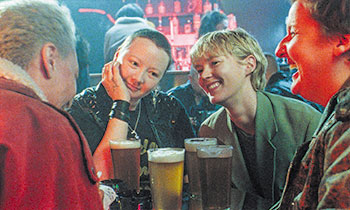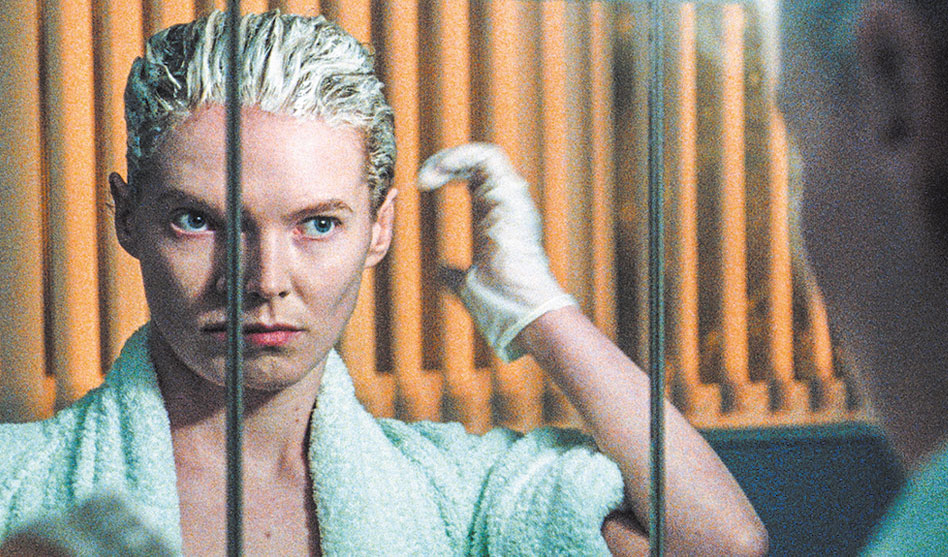Lesbian teacher Jean, Rosy McEwen, strips the color from her hair just as she strips away the remnants of her old life in Blue Jean
‘Blue Jean’ tells one lesbian’s story to remind us all of important lessons
JENNY BLOCK | Contributing Writer
jennyeblock@icloud.com
There are films that cling to you from the moment the opening scene begins to unfold. Blue Jean is one of those films.
It opens with the central character — Jean, played by Rosy McEwen — bleaching her hair. It is a simple but intimate act. It is also an act of stripping away — stripping away the color from the hair, of course, but also stripping away at what one’s appearance once was and replacing it with something new and, it could be argued, colorless.
Jean is a physical education teacher. She is also a lesbian, a lesbian who was once married to a man. The bleaching metaphor may be a heavy-handed one, but it is apt. Jean is constantly stripping away her old life, and yet she is not able, or maybe not willing, to fully live out her true, authentic life because she lives in England in 1988 during Margaret Thatcher’s conservative reign.
The film pulls back the curtain and exposes the tenuous and treacherous life Jean lives. She has a girlfriend named Viv, played by Kerrie Hayes, and she goes out to the gay bar with her lesbian friends. Still, she resides firmly in the closet. It is heartbreaking to watch, with the heartbreak further exacerbated by the arrival of a new student at her school: Lois, a young lesbian, played by Lucy Halliday.

Jean, Rosy McEwen, right, enjoys going to lesbian bars with her girlfriend Viv, Kerrie Hayes, left, but isn’t out to her coworkers at the school where she teaches
Late in the film, Lois is wrongfully accused of something terrible by another student who behaves much like many white, male Republican politicians do these days. In other words the student points the finger at someone else — Lois — to distract people from looking too closely at her.
Jean was a witness to the truth of the situation, but Jean does not come to Lois’ aid. But when she sees how much her behavior hurts Lois, Jean is suddenly and acutely aware of the how her being in the closet hurts not just her but also all of those around her, including her girlfriend.
It hurts young lesbians who are just coming out. It hurts the LGBTQ civil rights movement. It hurts her family who will never have the chance to know the real Jean. One might even say it hurts her colleagues who she brushes off again and again when they invite her to go out with them.
Coming out will most certainly be difficult for Jean. But very few things are as difficult as hiding who you truly are.
And, so, things begin to change, gradually: Jean blurts out, “I’m a lesbian” to a man who pesters her at a party. She makes amends to those she has hurt. And as the film ends, as we see Jean’s new life truly begin.
Blue Jean has a grainy, vintage feel and a delightful ’80s soundtrack. It is dark and rife with metaphor. Jean scrubs the sink, and it’s near impossible not to hear “Out, damn spot!” ringing in your head. A friend loans Jean a copy of Radclyffe Hall’s 1928 lesbian novel, The Well of Loneliness.
At the beginning of the film, we see a billboard promoting “traditional values.” At the film’s end we see that same billboard again, this time covered in graffiti: “Piss off Maggie.”
Georgia Oakley has crafted a precise and haunting story that is painful to watch and yet impossible to look away from — which is precisely what we need. We NEED to look harder rather than looking away.
It is harder to hate someone when we know their story. This is a story that lesbians, the greater LGBTQ community and — equally important — the straight community need to see and sit with and take in.
This is not every individual lesbian’s story. But it is part of our collective story. It is part of our herstory.
A philosopher once opined that the history we refuse to remember, we are doomed to repeat. We need this film. We need to watch this film. And more stories like these need to be made in to films. We need to remember.
Blue Jean reminds us that our personal struggles are part of a larger picture. It reminds us that hard things need to be remembered as much as — or perhaps even more than — joyful ones. This film reminds us that we as the lesbian community, as the LGBT community have vital stories to tell. So, thank you, Georgia Oakley, for telling this story.
Blue Jean is a film that clings to you like blanket — a heavy, wet blanket that refuses to let you go. It is also like a warm, comforting blanket reminding us there is comfort to be found in our shared history. We cannot understand if we do not know.












